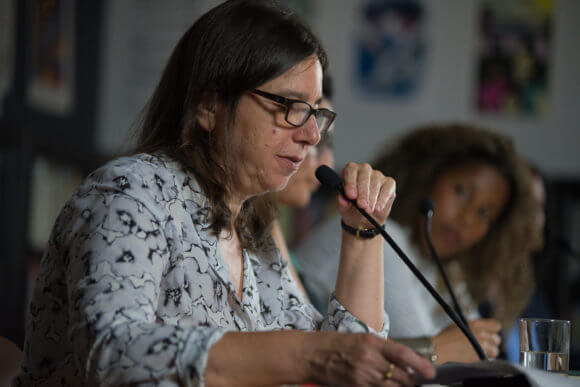One of the stars of the boycott conference at Penn was Sarah Schulman, the writer/professor who wrote the groundbreaking pinkwashing piece in the New York Times last November: How Israel uses gay-rights to launder its human rights violations.
In the Q-and-A, a man rose to ask Schulman how the piece had gotten into print. Schulman laughed and said, “Ok, here’s the back story.” And then told an astonishing story.
I’ll relate that story in a minute. First you have to eat your spinach: Schulman’s very wise ideas about the ways that the Palestinian solidarity movement can grow from “a vanguard movement to a popular movement.”
Schulman only got into Palestinian solidarity two years ago. But she has been a “hard-core” activist all her life, chiefly about AIDS and queer freedom. You can ask, Where has she been, what about Gaza? but that’s a stupid question, a question that blocks growth. And the beauty of Schulman’s engagement here is that when she was told not to go to Tel Aviv University two years ago, and she said, “What boycott?” she didn’t get defensive and nutty. No, she looked into the issue and saw that it was straightforward and simple– and then she was in.
This is the type of person we need to engage: morally clear, independent, brave people. Schulman’s own Jewishness dropped right away when she saw what Palestinians were experiencing. She had been there once, to see cousins. But any family allegiance simply dropped away when she saw what was going on. Beautiful.
And what Schulman counseled is that for the movement to grow and effect a paradigm shift in the U.S. discourse it must really work on its messaging. It must define one goal, ending US military aid to Israel. It must translate “manifesto culture to soundbite culture.” In doing so, it must avoid “heightened rhetoric, highly ideological language,” and academic language, including old left language.
It must do its utmost to find a Palestinian face who will be as imprinted for American news organizations and their bookers as Hanan Ashrawi was in a previous generation. It must open an office in NY with a Palestinian at the helm. It must seek celebrity endorsement.
And there was this, which I found personally persuasive and moving:
This movement reminds her of early days in LGBT and AIDS activism. It is a movement on behalf of rightsless people. (Hey–we are going to win!) But as the movement grows, “we have to be wise and we have to be flexible…. The founders [will] lose control of the discourse.” Ideological purity will fade away as more and more come into the movement. “That’s the price” of success. I believe Schulman completely. I wanted to hug her. (And by the way I am happy to sacrifice all ego-capital that I have accumulated here, for the sake of the family of Mustafa Tamimi, killed when he protested his village’s loss of access to its sole source of water).
OK, now you’ve had your high fiber. The Q-and-A came and a guy asked how Schulman managed to get the pinkwashing piece published. Here’s her tale:
Last June a “young, Chinese American gay guy” who had not long ago gone to work at the New York Times Op-Ed page reached out to Schulman to write a piece on the 30th anniversary of the discovery of AIDS.
Schulman said, “You want a progress narrative.” She couldn’t write that. The young op-ed editor said, No, but when Schulman turned in her piece, which was not a “progress narrative,” it got killed, as she had expected, and the Times ran a “progress narrative.”
The young editor felt bad about the outcome and asked her what else she could write for the Times. Schulman sensed that he had a “very idealistic idea of the Times,” and no sense of the “Jewish politics of the Times” (oh, I love this phrase, it is a gift of insight), but she said, “What about pinkwashing?” Huh? The international promotion by Israel of the freedom it gives gays in Israel as a means of masking its denial of human rights to Palestinians. She showed the editor some pieces from the Guardian.
“He said, ‘Sure.'”
Schulman knew what was coming. She turned in a “900 word piece with 150 pages of documentation…. [and] for the next three months we fought over the piece…. [at times] we literally screamed at each other.”
The Times op-ed staff came up with question after question to challenge Schulman’s assumptions. No one there knew that she had a “secret research team of queer women,” translating documents from Arabic, Dutch, German and Hebrew!
One of the foolish queries on the piece was: “You have to prove that Israeli gay people are anti-Arab.” And there were “all these ridiculous delays.”
The documentation grew to 300 pages, and the Times just “couldn’t come up with something that would justify killing it.”
The piece ran on November 22. And I don’t see much evidence of “pulling and hauling,” as one of our earlier writer-savants puts struggling with the world. A fine piece, it ends: “The long-sought realization of some rights for some gays should not blind us to the struggles against racism in Europe and the United States, or to the Palestinians’ insistence on a land to call home.”
The piece was sensational. It is surely Schulman’s most famous writing. She took great pleasure when Benjamin Netanyahu cited it as a reason that he would not contribute to the New York Times.
And then a postscript. Schulman said that on January 24, the NYT ran this AP report saying that Tel Aviv is a great gay destination– “a plant” for the Israeli government, a “piece that had never been factchecked… rife with factual inaccuracies.”
Schulman concluded that the piece was “obviously some deal brokered between the Times and the Israeli government.” She wrote to her young editor to ask if the piece had undergone anything like the scrutiny that hers had received during its 3-month gestation. She did not hear from him.



“She did not hear from him.” (Hope he still has a job at the NYT. Or somewhere.)
. . . and no sense of the “Jewish politics of the Times”
What an incredible euphemism.
In other words, the Times is biased in favor of Jews and what’s directly and materially good for them alone (while, I might add, policing American discourse for any sign of other people’s ethnic biases).
“Tribal ethics! Tribal ethics! Get your freshly printed tribal ethics hot off the presses! All the tribal ethics that’s fit to print–right here in The New York Times!”
Great to hear how the article came about…no surprise that it was through the fluke of an editor who had “no sense of the “Jewish politics of the Times””. Endless respect to Schulman for fighting through & getting such a potent article published.
This is all sage advice too…
“…for the movement to grow and effect a paradigm shift in the U.S. discourse it must really work on its messaging. It must define one goal, ending US military aid to Israel. It must translate “manifesto culture to soundbite culture.” In doing so, it must avoid “heightened rhetoric, highly ideological language,” and academic language, including old left language.”
“It must do its utmost to find a Palestinian face who will be as imprinted for American news organizations and their bookers as Hanan Ashrawi was in a previous generation. It must open an office in NY with a Palestinian at the helm. It must seek celebrity endorsement.”
RE: “Schulman said that on January 24, the NYT ran this AP report saying that Tel Aviv is a great gay destination— ‘a plant’ for the Israeli government, a ‘piece that had never been factchecked… rife with factual inaccuracies’.”
FROM WIKIPEDIA:
SOURCE – http://en.wikipedia.org/wiki/2009_Tel_Aviv_gay_centre_shooting
You know, reading this, I think of when everyone is attacking you for talking about the intra-Jewish communal debate that has to get started – I mean really started.
You talk frankly about the issues Sarah Schulman raises, the ‘Jewish politics’ at the Times. And yes, it’s all there to see. I mean, the NY Mag frontpage plant by Ronen Bergman, the frontpage NYT story about Adelson – without even a word about Israel?
All these came after pressure was put on the NYT, probably from the higher echelons of the Jewish American community after the fall which did, let’s be honest, for once consist of a more balanced and critical view of Israel, from a purely liberal perspective.
But her story still proves just biased towards Israel the paper of record remains, despite the right-wing propaganda on the contrary. This is part of the reason why the struggle against Israeli apartheid will be much longer, White-rule South Africa didn’t have an entire lobby in America, one that extends far into the media sphere, to protect it.
But that doesn’t mean it can’t be done, and that that Apartheid should be taken on – without demonizing Jews in general which is also important to avoid.